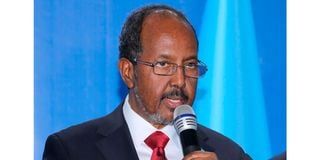Use Somalia EAC entry for region’s economic renewal

Somalia President Hassan Sheikh Mohamud.
Academic and politician Ahmet Davutoğlu, a former Prime Minister of Turkey and foreign minister during the 2011 ‘Arab Spring’, emphasised historic reassessments to transform the Arab region into one of stability, freedom, prosperity, cultural revival and co-existence.
The ‘Arab Spring’ had varying degrees of success, particularly in Tunisia, but his words are a poignant reminder of the aspirations for positive change.
Months after Somalia’s admission into the East African Community (EAC), his sentiments resonate with my reflections.
This was a pivotal moment that will mark its progress towards economic empowerment and regional integration. It offers the Horn of Africa nation a huge opportunity for conducive environments and regulatory frameworks that bolster investor confidence and safeguard property rights.
The developmental forces of technology, climate change and global economic integration become more pronounced, presenting unique challenges and opportunities for Somalia, and East Africa.
Technological advancements must be capitalised to adapt to the evolving workforce landscape and ensure sustained development.
Somalia needs to focus on education and skill development to equip its workforce with the competencies for the modern job market. Drawing inspiration from successful models like Kenya’s Competency-Based Curriculum (CBC), Somalia can enhance its educational system to meet the demands of the evolving economy.
Further embracing digital literacy, investing in STEM education and enhancing vocational training programmes will ensure a competitive and adaptable workforce. Besides building capacity within government institutions, it is imperative to enhance governance, transparency and accountability.
Prioritising infrastructure development, fostering partnerships with international organisations, creating an enabling regulatory framework, strengthening internal capabilities and promoting a culture of entrepreneurship and innovation are essential for successful integration into the global market.
For a long time, the region has grappled with a persistent disparity between the availability of labour and demands of the job market. Rectifying the resulting challenges necessitates a concerted and extensive effort, compelling us to surpass the conventional measures adopted by nearby economies.
Addressing the supply side of the equation mandates a comprehensive overhaul of our education systems, commencing from the foundational levels. That should prioritise the cultivation of essential competencies required by the contemporary economy.
Despite its strong participation in international trade, East Africa’s export environment points to a lack of substantial job creation and employment. At its level, the region could be unprepared for a smooth integration into the global market. A measured approach is vital, waiting to increase its international trade until it is able to export sophisticated technologies instead of just basic commodities.
The EAC can also invest in digital infrastructure and technologies that streamline administrative processes, facilitate communication and enhance efficiency. A digitally connected East Africa can create a conducive environment for businesses to thrive, thus formalisation of job opportunities.
Another is adoption of a common currency, similar to Croatia’s and all EU members transition to the euro. That has been described by former UK Prime Minister Tony Blair as an economic move that would lead to development and had brought about economic stability and facilitated trade within the bloc. But that requires adherence to economic and legal criteria, encouraging EAC to implement the structural reforms needed for currency integration.
The recent agreements between the EU and the Economic Community of West African States (Ecowas) would also be worth emulating. The two blocs signed seven financing deals worth €212.5 million to stabilise and develop Ecowas. Two of the EU’s feats are the common market and the euro. If implemented well by embracing innovation, investing in human capital and fostering collaboration, East Africa can realise its full potential in the face of a rapidly evolving global landscape.
- Mr Warfa is a former Minister of Labour of the Federal Republic of Somalia and represented Mudug Constituency in the Federal Parliament. @HonWarfa





